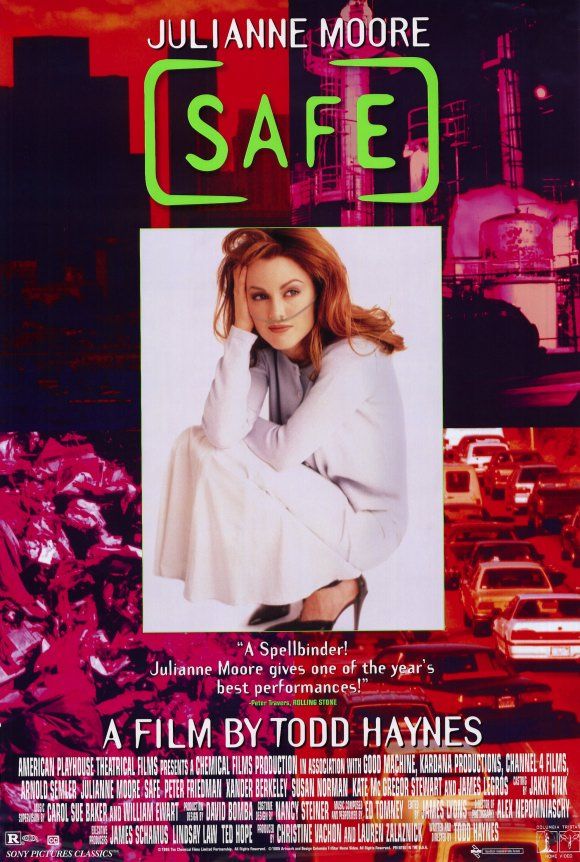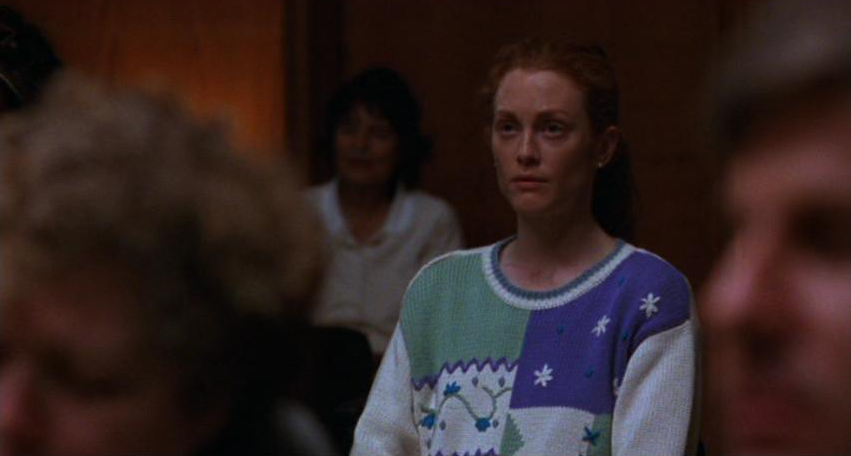Safe
1995
Director: Todd Haynes
Starring: Julianne Moore
First
things first: massive thanks to Chip of Tips From Chip for supplying me the
opportunity to actually watch this film.
Talk about fortuitous timing: the day this was announced as an upcoming
Movie of the Week at Squish’s 1001 Movies Blog Club was the same day that I got
my flashdrive in the mail from Chip with, amongst other things, this film on
it. So a big yay for that, because
otherwise, it would have been much more difficult trying to track this one
down.
Second
things second: I have a fairly massive girl crush on Julianne Moore. The woman can do no wrong for me. I am not one to try to see an entire actor’s
filmography, mostly because I know that there tends to be a ton of junk in any
actor’s filmography, but Julianne Moore is one for whom I would make an exception. Even if her movie is crap, her presence
alone is enough to make me enjoy it. Laws
of Attraction is proof positive of that. How on earth she has not yet won an Oscar is
completely beyond me. The fact that
she’s “only” been nominated four times is also completely crazy. At least to me.
Safe, then, is all about Julianne
Moore (which is a-okay with me). Moore
plays Carol, a diminutive, sheepish, and insipid affluent suburban housewife in
1987 California. Carol has unfulfilling
sex with her husband (Xander Berkeley), shallow conversations with her friends,
and redecorates her house with full-on eighties décor. Slowly, very slowly, Carol starts to get
sick. It starts with just a general
fatigue, but it escalates to respiratory problems and even collapse. Indignant doctors tell her nothing is
actually wrong with her and refer her to a psychiatrist, who is equally
unhelpful. Frustrated, Carol hears of
“environmental illness,” where a person becomes allergic to the chemicals
associated with modern society, and concludes this is her malady. When she sees an advertisement for a New
Age-esque retreat for people suffering from environmental illness, she decides
to join.
This
movie, as I said before, is all about Julianne Moore. There is hardly a scene without Carol; this
is Carol’s tale, through and through, and she is an intriguing character. She’s intriguing BECAUSE she is so insipid,
BECAUSE she doesn’t come across as the brightest bulb in the box. She’s not a blithering idiot, but she’s
living an extraordinarily superficial life that lacks any sort of real
emotional connections or fulfillment.
Watching something serious happen to someone who is so unable to deal
with it is interesting. More than that,
it’s interesting watching the people in Carol’s life react to Carol’s
illness. Everyone in Carol’s life is
frighteningly detached, each floating along, turning a blind eye to anything
too substantive. Her husband is
supportive to a degree, but also frustrated and somewhat skeptical. Her friends are kind to her in person, but
discuss her behind her back. Not
nastily, but nonetheless with an air of gossip around it. She explains her illness to her best friend,
who barely reacts to her. Does Carol
feel her husband’s skepticism of her?
Can she tell that her friend is tuning her out? For my money, I don’t know, but that’s a good
thing. Moore is so phenomenal at hinting
at Carol’s depths that it’s entirely possible Carol is taking in everything
around her but choosing to continue along her chosen path. Carol has a very, very slow decline, and
Moore slowly, ever so slowly, dials up the illness and the paranoia. To go to a musical analogy, one of the hardest
things to do is a slow crescendo or slow decrescendo. I love Ravel’s “Bolero,” but I’m glad I’ve
never performed it, and I would never WANT to perform it. The entire piece is a twelve minute long
crescendo. The amount of control
required to do that is immense, and I honestly doubt that I lack the discipline
as an instrumentalist to pull off such a feat.
And yet, that is precisely what Moore does with Carol. She slowly and carefully takes Carol’s world
of vapid baby showers and dull dinner parties and removes Carol from it. It’s so impressive. She’s so awesome. Man, I love her. Can I marry Julianne Moore?
Moore’s
performance, as awesome as it is, would not have happened without Todd Haynes
and his direction. The shot composition
is always incredibly mindful not of Carol, but Carol’s surroundings and how she
fits into them. So often, Haynes shoots
Carol as small, very small, and from very far away. He creates a distance between Carol and the
camera, highlighting her isolation and lack of meaningful connections. We see Carol’s house, with its fashionable
décor and trendy eighties colors, but it is overpowering in its garish grandeur. Carol is simply existing in this vast, grand
space. When Carol has to deal with a
“trauma” at her house (the delivered couch was the wrong color), she is shot
from afar in a very large warehouse with a very tall ceiling. At the psychiatrist’s office, Carol is like a
tiny mouse huddled on the couch, too timid to speak up. The taciturn psychiatrist is of little help,
and once again, the space threatens to overwhelm her. Lastly, Carol’s New Age-y retreat is in the
middle of the desert, surrounded by nothing BUT empty spaces. Perhaps it is my slight agoraphobia speaking,
but I felt these spaces acutely. They
made me feel uncomfortable. Perhaps they
made Carol feel uncomfortable as well.
In
addition to the physical sense of emptiness in this movie, Haynes uses very
sparse dialogue. There’s a tremendous
amount of silence. Words are few, far
between, and hollow. All of this paints
a picture of Carol’s sad little life. In
a heartwrenching scene, Carol is frightened, crying in bed. She cries out to her husband, “Where am I?” All he replies is “We’re in our house. Greg and Carol’s house.” The silence that punctuates this sentence is consuming. On top of all of this sense of disconnect,
Haynes makes a very interesting choice.
He layers on a classic, threatening horror movie soundtrack. Nothing that happens in the film is anywhere
close to classic horror trappings, but by combining the sense of emptiness and
a lack of an explanation for Carol’s distress with freaky synthesizer effects,
Haynes effectively increases the tension throughout the film. He turns the screw for the audience, over and
over again, making us feel like we should anticipate something awful
happening. Much in the same way that
Haneke takes a fairly straightforward and somewhat nontraditional horror
premise in Caché and makes me squirm with fright, Haynes does it here by
hinting that suburbia is entirely capable of overwhelming and overtaking a
susceptible soul.
 |
| Try to find Carol in this shot. She gets eaten up by her "perfect" home. |
I’ve
said it before, but I’ll say it again: I really like ambiguity in film. I like directors who can trust that their
audience is smart enough to think on their own.
I like having choices presented to me without answers. Safe is totally and completely that
kind of film. Haynes never spells out
what exactly is causing Carol’s illness, and that, to me, is a major strength
of this film. While I can understand how
it might frustrate some viewers, it enthralls me. Haynes hints that Carol’s illness may be
entirely in her head, but he doesn’t commit either way. There are arguments both for and against
this. Is she really becoming allergic to
her environment, or is she simply so bored with her vapid existence that she
concocts something to do with her life out of nothing? That isn’t the only unanswered question,
though. The retreat that she moves to in
the second half of the film raises entirely new issues. Is this a legitimate holistic medical
treatment facility, or a cult? How much
is it actually helping Carol? Are they
brainwashing her or has she found a legitimate spiritual connection?
So
here’s what I have to say about all of this.
Personally, I think Carol’s “illness” (note the quotation marks) is
entirely psychosomatic. She’s so
superficial, so bored, that the nothingness of her life starts to consume
her. Desperate for an answer, she
latches on to this “environmental illness” thing because it’s vague enough to
explain her symptoms. The retreat is
essentially a cult in disguise that makes Carol feel her “illness” is
legitimate, but in doing so, pushes her further down the rabbit hole of
obsessive behavior.
All
of the above paragraph is my personal interpretation of the film. And isn’t that a glorious thing? I was raised by my parents, and my father is
one of the most skeptical people I have ever met. I am all about science and rational
explanations. I hate the use of the
phrase “chemicals,” because seriously, everything around us is made of
chemicals. Water’s a chemical, for
crying out loud, so when I see people falling back on vague, generic, and
incorrect terms like that, my skeptic senses are sent tingling. Carol blames “chemicals” for her illness, and
I call foul. Furthermore, I rather
detest New Age-y touchy-feely nonsense (that’s putting it lightly), so as soon
as Carol gets to her retreat, I start to feel uneasy. I feel it’s a trap, meant to lure unwitting
outsiders into its clutches. Hence, I
make the decision it’s a cult.
But
all of this, ALL OF THIS, is because of who I am as a person. Who I am, what I believe in, how I was
raised. I use these things to interpret Safe,
because Haynes left enough open-ended and balanced representations in his film
for me to do that. This is precisely
what Abbas Kiarostami is all about, and the film that I was most reminded of
after I finished watching Safe was Kiarostami’s The
Wind Will Carry Us. The glorious
thing is that Haynes is restrained enough for me to understand that HE is not
telling me these things, but that I am connecting the dots he drew in my own
particular way. I fully admit that
Carol’s retreat is not necessarily a cult; it just feels that way TO ME. To others, others who believe more in
holistic healing than I do, the retreat probably feels like a very sensible
place for Carol to recover. Haynes’
direction allows them to make that conclusion, and for me to make mine. And I really respect that.
Safe is hardly mainstream America’s
cup of tea. It’s quiet, it’s slow, it
has a sense of superficial detachment that is hardly warm and fuzzy, and it
refuses to provide easy answers. This
will appeal to a very distinct audience, however, and is worth seeing just for
Moore’s outstanding performance alone.
Sure, I’m a Julianne Moore fangirl, but even I think her turn as Carol
ranks among her strongest performances.
Go in with an open mind, be prepared for a slow story, and let it pull
you along for the ride.
Arbitrary
Rating: 8/10. Not for everyone, but very
intriguing nonetheless.


I'm not reading this review yet, because Safe is on my list for January. It's one I'm really looking forward to seeing. All I'm checking out here is your score, which is encouraging.
ReplyDeleteI hear that, and I've been there! I enjoyed it. It gave me a lot to think about. And I heart Julianne Moore forever and ever and ever.
Delete